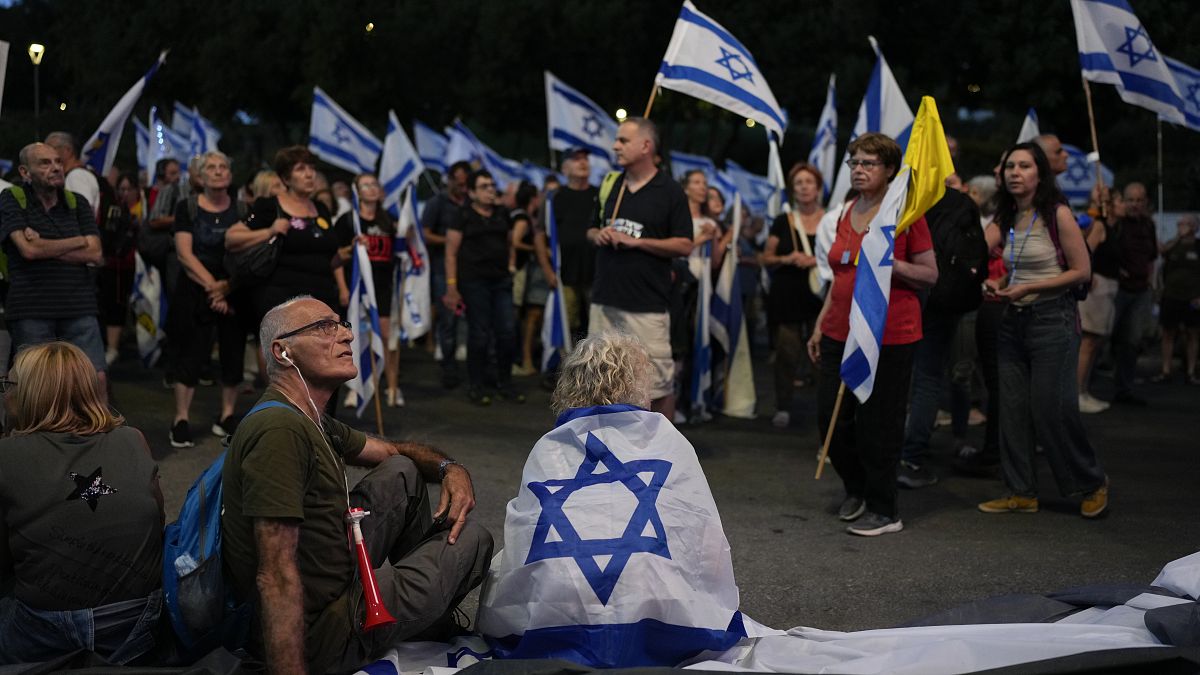In Jerusalem, tens of thousands of protesters gathered outside Israeli Prime Minister Benjamin Netanyahu’s residence, calling for immediate elections and an end to the war in Gaza. The protesters clashed with police, who used water cannons against those who breached the barriers. Nine protesters were arrested during the demonstration. Many Israelis are frustrated with Netanyahu’s handling of the ongoing war and accuse him of putting political interests ahead of the country’s best interests. They demand a deal to stop the fighting and secure the release of hostages still held in Gaza.
Netanyahu has denied the accusations and insists that he has the country’s best interests in mind. The Prime Minister dissolved the three-man war Cabinet responsible for navigating the conflict, following the resignation of opposition lawmaker Benny Gantz from the coalition government. Gantz cited frustration with Netanyahu’s management of the war as the reason for his departure. The protesters in Jerusalem, led by activists who have been organizing anti-government demonstrations for weeks, are calling for the removal of the current government, which they view as corrupt and incompetent in handling the war and hostage situation.
The anti-government protests have become a regular occurrence, with demonstrations taking place weekly on Saturday nights. Monday’s protest in Jerusalem included activists who previously protested against Netanyahu’s attempts to overhaul the judiciary in 2023. The protesters marched from the Knesset, Israel’s parliament, to Netanyahu’s private residence, carrying Israeli flags and chanting anti-government slogans. The signs at the protest reflected the anger and frustration of the people, with messages like “Because of you we are dying, get out of our lives” and “Combat soldiers refuse to be killed because of Bibi.” The reference to the 11 soldiers killed in Gaza over the weekend highlights the toll of the ongoing conflict on Israeli troops and the dissatisfaction with Netanyahu’s leadership.
The protests against Netanyahu and his government have intensified in response to the perceived mishandling of the war in Gaza and the failure to secure the release of hostages. Many Israelis feel that the government has lost control of the situation and are demanding a change in leadership. Netanyahu’s decision to dissolve the war Cabinet and the resignation of a key opposition lawmaker have only fueled the discontent among the people. The protesters are determined to continue demonstrating until their demands for elections and an end to the war are met.
Despite Netanyahu’s insistence that he has the country’s best interests at heart, the protesters remain unconvinced. They see his actions as self-serving and prioritizing political gain over the well-being of the nation. The anger and frustration on display at the protests reflect the deep divisions within Israeli society over the handling of the war and the government’s response to the crisis. The calls for change are growing louder, and it remains to be seen how Netanyahu will respond to the mounting pressure from the people. As the protests continue to gain momentum, the future of the government and the direction of the war in Gaza hang in the balance.
In conclusion, the protests in Jerusalem against Prime Minister Netanyahu and his government are a reflection of the growing discontent among Israelis over the handling of the war in Gaza and the ongoing hostage situation. The clashes between protesters and police outside Netanyahu’s residence highlight the deep divisions within Israeli society and the calls for change in leadership. The protesters are demanding immediate elections and an end to the war, criticizing Netanyahu for putting political interests ahead of the country’s best interests. As the demonstrations continue to gain momentum, the pressure on Netanyahu and his government is mounting, raising questions about the future of the nation’s leadership and the resolution of the conflict in Gaza.











